In March 2016, European governments breathed a sigh of relief as the European Union reached a deal with Turkey designed to stop hundreds of thousands of refugees and migrants heading into the heart of Europe. For many of those who had fled war, hunger and poverty hoping for a bright future on the continent, the deal shattered their dreams.
Three years on, here is a look back at the agreement and the effect it's had on migration.
Click to Gallery
In March 2016, European governments breathed a sigh of relief as the European Union reached a deal with Turkey designed to stop hundreds of thousands of refugees and migrants heading into the heart of Europe. For many of those who had fled war, hunger and poverty hoping for a bright future on the continent, the deal shattered their dreams.
One of the main provisions of the deal, which came into effect on March 20, 2016, was that all those arriving on Greek islands from the nearby Turkish coast — the preferred route at the time — would be detained and returned to Turkey unless they successfully applied for asylum in Greece. They wouldn't be able to move on to the Greek mainland, from where hundreds of thousands before them had made their way through the Balkans and on to central and northern Europe.
On a very basic level of reducing the number of asylum-seekers heading to other European countries, the deal was very effective.
Aid groups have repeatedly slammed the deal as inhumane, noting it has left thousands stranded in miserable conditions. On the eve of its third anniversary, 25 human rights, medical aid and volunteer groups signed an open letter calling on European leaders "to take immediate and sustained action to end the unfair and unnecessary containment policy."
The stipulation of new arrivals being held on the islands has left thousands languishing in crammed camps. Samos island has seen the worst overcrowding, with around 4,000 people vying for space in a camp with a capacity of 648. The largest camp in the eastern Aegean, Moria on the island of Lesbos which holds more than 4,800 people in facilities designed for 3,100, has come under the severest criticism from rights groups and even local officials over poor living and security conditions.
"Greece has become a dumping ground for the men, women and children that the European Union has failed to protect," Emmanuel Goue of the Doctors Without Borders medical aid group said in a statement on the third anniversary of the EU-Turkey deal.
The increased difficulty heading into Europe from the Greek islands meant migrants and refugees soon sought out alternative routes to get into the EU. With more than 57,000 unauthorized arrivals by sea in 2018, Spain became the No. 1 route to the EU by sea. The figure was more than double the number of arrivals in 2017 at 21,000. NGOs and the Spanish government itself blamed the increase on the EU-Turkey deal and on later agreements with Libya which essentially shut down the central Mediterranean route which had seen boats head from Libya to Italy.
WHAT DID THE EU-TURKEY DEAL SAY?
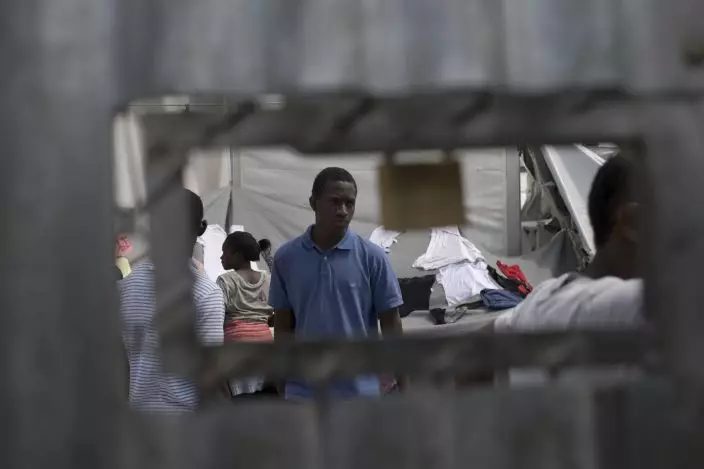
FILE - In this Friday, May 4, 2018 file photo, newly arrived migrants and refugees wait to be registered by authorities in Moria Camp, on Lesbos, Greece. European governments breathed a sigh of relief as the European Union reached a deal with Turkey designed to stop hundreds of thousands of refugees and migrants heading into the heart of Europe. For many of those who had fled war, hunger and poverty hoping for a bright future on the continent, the deal shattered their dreams. (AP PhotoPetros Giannakouris, File)
One of the main provisions of the deal, which came into effect on March 20, 2016, was that all those arriving on Greek islands from the nearby Turkish coast — the preferred route at the time — would be detained and returned to Turkey unless they successfully applied for asylum in Greece. They wouldn't be able to move on to the Greek mainland, from where hundreds of thousands before them had made their way through the Balkans and on to central and northern Europe.
However, the deportations didn't go as planned. Instead of waiting to apply for asylum in their preferred European country, new arrivals applied as soon as they arrived on the islands, which delayed deportations and created a massive backlog in Greece's asylum system. In practice, actual deportations have been very few and far between.
DID THE AGREEMENT WORK?
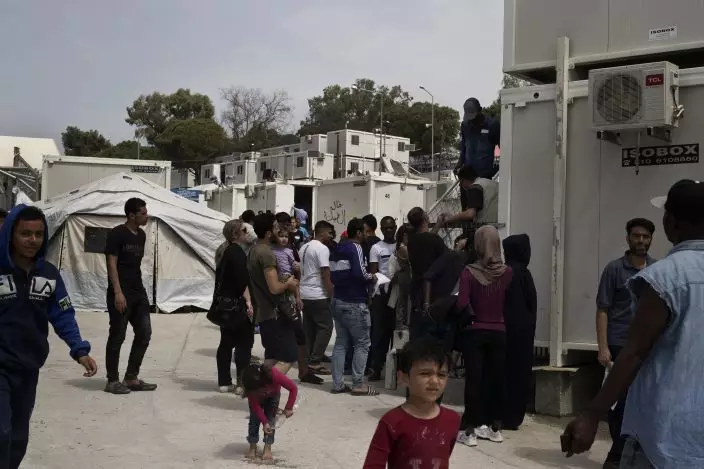
FILE - In this Friday, May 4, 2018 file photo, migrants and refugees wait outside the UNHCR offices for their papers, inside the camp of Moria, Lesbos island, Greece. European governments breathed a sigh of relief as the European Union reached a deal with Turkey designed to stop hundreds of thousands of refugees and migrants heading into the heart of Europe. For many of those who had fled war, hunger and poverty hoping for a bright future on the continent, the deal shattered their dreams. (AP PhotoPetros Giannakouris, File)
On a very basic level of reducing the number of asylum-seekers heading to other European countries, the deal was very effective.
More than 1.2 million people registered for asylum in EU member states in 2015 and again in 2016, at the height of the crisis. That number fell by half the following year, with just over 654,000 new asylum applications in 2017 and even fewer — just over 580,000 — in 2018, according to the EU's statistics office Eurostat. Germany continues to be the most popular country for those seeking refugee status, followed by France and Greece. The main countries of origin of the applicants are Syria, Afghanistan and Iraq.
But the reduction in numbers has come at a cost.
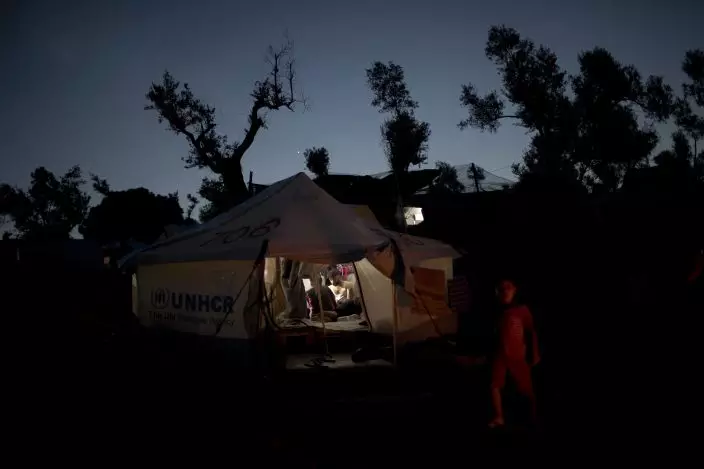
FILE - In this Tuesday, May 2, 2018 file photo, a Syrian family sit inside a tent at a makeshift camp outside Moria on the northeastern Aegean island of Lesbos, Greece. European governments breathed a sigh of relief as the European Union reached a deal with Turkey designed to stop hundreds of thousands of refugees and migrants heading into the heart of Europe. For many of those who had fled war, hunger and poverty hoping for a bright future on the continent, the deal shattered their dreams. (AP PhotoPetros Giannakouris, File)
Aid groups have repeatedly slammed the deal as inhumane, noting it has left thousands stranded in miserable conditions. On the eve of its third anniversary, 25 human rights, medical aid and volunteer groups signed an open letter calling on European leaders "to take immediate and sustained action to end the unfair and unnecessary containment policy."
It has also not completely stopped arrivals on Greek islands, although the numbers are far lower than the thousands per day in 2015 and early 2016.
WHAT IS THE SITUATION ON THE ISLANDS?

FILE - In this Friday, May 4, 2018 file photo, a woman walks with her baby as migrants and refugees wait outside the UNHCR offices for their papers inside the camp of Moria, Lesbos island, Greece. European governments breathed a sigh of relief as the European Union reached a deal with Turkey designed to stop hundreds of thousands of refugees and migrants heading into the heart of Europe. For many of those who had fled war, hunger and poverty hoping for a bright future on the continent, the deal shattered their dreams. (AP PhotoPetros Giannakouris, File)
The stipulation of new arrivals being held on the islands has left thousands languishing in crammed camps. Samos island has seen the worst overcrowding, with around 4,000 people vying for space in a camp with a capacity of 648. The largest camp in the eastern Aegean, Moria on the island of Lesbos which holds more than 4,800 people in facilities designed for 3,100, has come under the severest criticism from rights groups and even local officials over poor living and security conditions.
Greek authorities note that the terms of the EU-Turkey agreement prevent them from moving people off the islands en masse. Instead, they have tried to ease overcrowding by sending to the mainland those designated as vulnerable — such as the sick or very elderly, families with young children or single parent families.
But with dozens, sometimes hundreds, arriving each week, that hasn't been enough to definitively deal with the problem. As of Monday night, a total of 14,742 people were being held on the islands, most of them on Lesbos, Samos, Chios, Leros and Kos.

FILE - In this Friday, May 4, 2018 file photo, migrants and refugees wait outside the European Asylum Support Service offices inside the camp of Moria on the northeastern Aegean island of Lesbos, Greece. European governments breathed a sigh of relief as the European Union reached a deal with Turkey designed to stop hundreds of thousands of refugees and migrants heading into the heart of Europe. For many of those who had fled war, hunger and poverty hoping for a bright future on the continent, the deal shattered their dreams. (AP PhotoPetros Giannakouris, File)
"Greece has become a dumping ground for the men, women and children that the European Union has failed to protect," Emmanuel Goue of the Doctors Without Borders medical aid group said in a statement on the third anniversary of the EU-Turkey deal.
"What was once touted as a 'refugee emergency' has given way to inexcusable levels of human suffering across the Greek islands and on mainland Greece," Goue said. "The EU and Greek authorities continue to rob vulnerable people of their dignity and health, seemingly in an effort to deter others from coming. This policy is cruel, inhumane and cynical, and it needs to end."
WHAT ABOUT THE REST OF EUROPE?
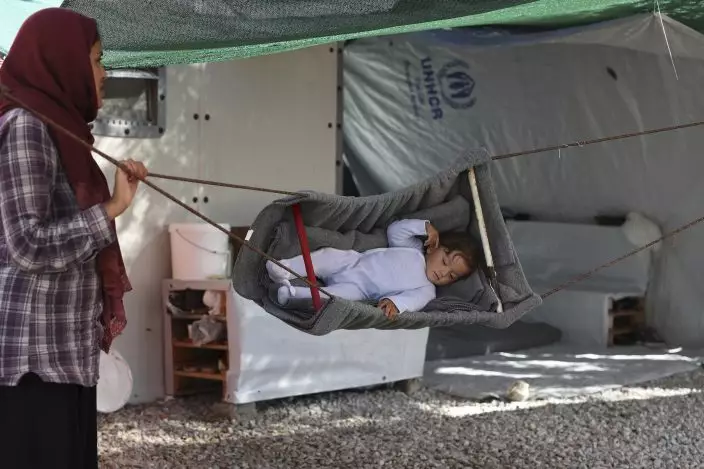
FILE - In this Thursday, Oct. 6, 2016 file photo, a woman uses a makeshift swing for a small child at the Kara Tepe camp for refugees and other migrants on Lesbos island, Greece. European governments breathed a sigh of relief as the European Union reached a deal with Turkey designed to stop hundreds of thousands of refugees and migrants heading into the heart of Europe. For many of those who had fled war, hunger and poverty hoping for a bright future on the continent, the deal shattered their dreams. (AP PhotoPetros Giannakouris, File)
The increased difficulty heading into Europe from the Greek islands meant migrants and refugees soon sought out alternative routes to get into the EU. With more than 57,000 unauthorized arrivals by sea in 2018, Spain became the No. 1 route to the EU by sea. The figure was more than double the number of arrivals in 2017 at 21,000. NGOs and the Spanish government itself blamed the increase on the EU-Turkey deal and on later agreements with Libya which essentially shut down the central Mediterranean route which had seen boats head from Libya to Italy.
There has, however, been a sharp decrease in the number of arrivals by sea in Spain in late 2018 and the first three months of this year.
More people are also dying. According to the International Organization for Migration, around 2,300 people died crossing the Mediterranean Sea last year, almost double the year before. Nearly one third of them perished in the so-called Western Mediterranean, which links the northwestern African coast with European coasts in Spain.
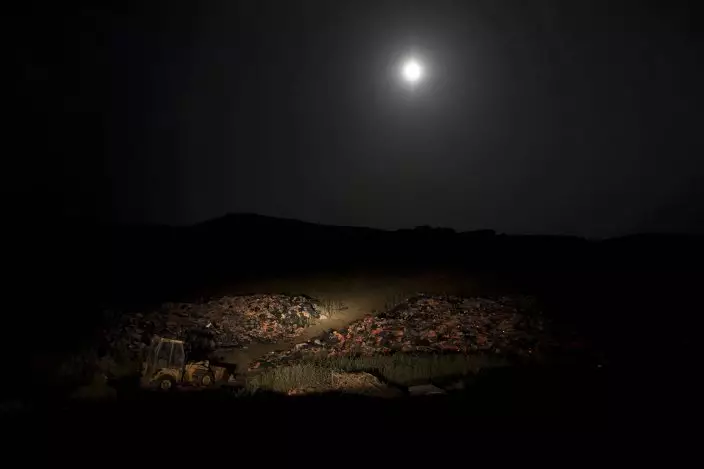
FILE - In this early Saturday May 5, 2018 file photo, the moon rises above piles of discarded life vests and dinghies used by migrants and refugees crossing from the nearby Turkish coast, at a dump on the Greek island of Lesbos. European governments breathed a sigh of relief as the European Union reached a deal with Turkey designed to stop hundreds of thousands of refugees and migrants heading into the heart of Europe. For many of those who had fled war, hunger and poverty hoping for a bright future on the continent, the deal shattered their dreams. (AP PhotoPetros Giannakouris, File)
Aritz Parra in Madrid, and Derek Gatopoulos in Athens, contributed to this report.
PARIS (AP) — French President Emmanuel Macron warned Thursday that Europe could “die” if it fails to build its own robust defense as Russia’s war in Ukraine rages on, or if it fails to undertake major trade and economic reforms to compete with China and the U.S.
Macron urged Europeans to become more ambitious in a fast-changing world to face the challenges of war, fierce trade competition, energy scarcity, climate change and increasing authoritarianism.
In a nearly two-hour speech at Sorbonne University in Paris, Macron said that the continent is divided and “too slow and lacks ambition” at a time when the 27-member European Union needs to become a superpower, defend its own borders and speak with one voice if it wants to survive and thrive.
“Our Europe today is mortal,” Macron said. “It can die and that depends solely on our choices,” he added. He called on people to make those choices now because, “it’s today that Europe is between war and peace.”
Russia's full-scale invasion of Ukraine, now in its third year, is an existential threat and Europe isn't armed enough to defend itself when “confronted by a power like Russia that has no inhibitions, no limits,” Macron said.
‘Our ability to ensure our security is at stake," Macron said. “Russia mustn’t be allowed to win.”
Europe now has the “good fortune” of having the Biden administration’s commitment to supporting Ukraine, Macron said. But, in a year of key elections around Europe, in the U.S. and elsewhere, support may fragment or disappear entirely, he added.
“Europe must become capable of defending its interests, with its allies by our side whenever they are willing, and alone if necessary,” Macron said.
Strong armies, a European rapid intervention program and force, tanks, a missile shield and other weapons, produced in Europe, will need the support of “a joint diplomatic force that will speak with one voice and build bridges with Africa and Latin America,” the French leader said.
“Only then will Europe show that it's not a United States’ lap dog, and that it also knows how to talk to other regions of the world,” he said.
France has been a firm supporter of Ukraine in its fight against Russian aggression, and Macron has often clashed with other Western leaders as he has insisted that Europe must stand by the country at any cost. The French president alarmed European leaders by saying recently that sending Western troops into Ukraine to shore up its defenses shouldn’t be ruled out.
Referring to trade practices of China and the U.S., Macron said “the two world powers have decided not to respect the rules of global trade” by shoring up protections and subsides while Europe’s industry remains open and is stuck in overregulation.
“Let’s do the same, we are in competition,” Macron said.
“We must buy faster, we must produce more and we must buy more that is made in Europe. That is key,” Macron said.
Thursday's speech came less than two months before a pivotal European Parliament election.
Macron, an avid advocate of a united and assertive Europe, also rallied support for his centrist Renaissance party before the June 6-9 vote as far-right parties lead the moderate coalitions in the polls. He called for safeguarding democratic values as the “authoritarian model” was becoming “more popular” across the continent.
The war in Ukraine and immigration are top priorities for European Union voters, according to polls. Far-right parties have gained support by criticizing Macron’s government policies on both issues. Macron acknowledged divisions on immigration policies, including on asylum and deportation rules for those who have arrived to Europe illegally.
He emphasized the need for an effective response and Europe-wide coordination for curbing illegal immigration, closer cooperation with immigrants' countries of origin and a unified, relentless fight against human traffickers.
Macron criticized the idea of striking an agreement, as Britain as done, with countries in Africa and elsewhere to transfer immigrants there.
“This is a betrayal of our values that ultimately leads us to dependency on other counties,” Macron said.
The British government earlier this week approved a law allowing the deportation of some migrants who enter the country illegally to Rwanda.
Macron lost his majority in France’s most influential house of parliament, the National Assembly, after the 2022 election to the far-left coalition and the far-right National Rally party.
The social situation in France remains tense as Paris prepares to host the Olympic Games this summer, amid protests from teachers and police officers, and farmer demonstrations in recent weeks. The protests follow huge rallies last year against Macron’s ultimately successful proposal to increase the retirement age from 62 to 64.
Barbara Surk reported from Nice, France. Lorne Cook contributed to this report from Brussels.
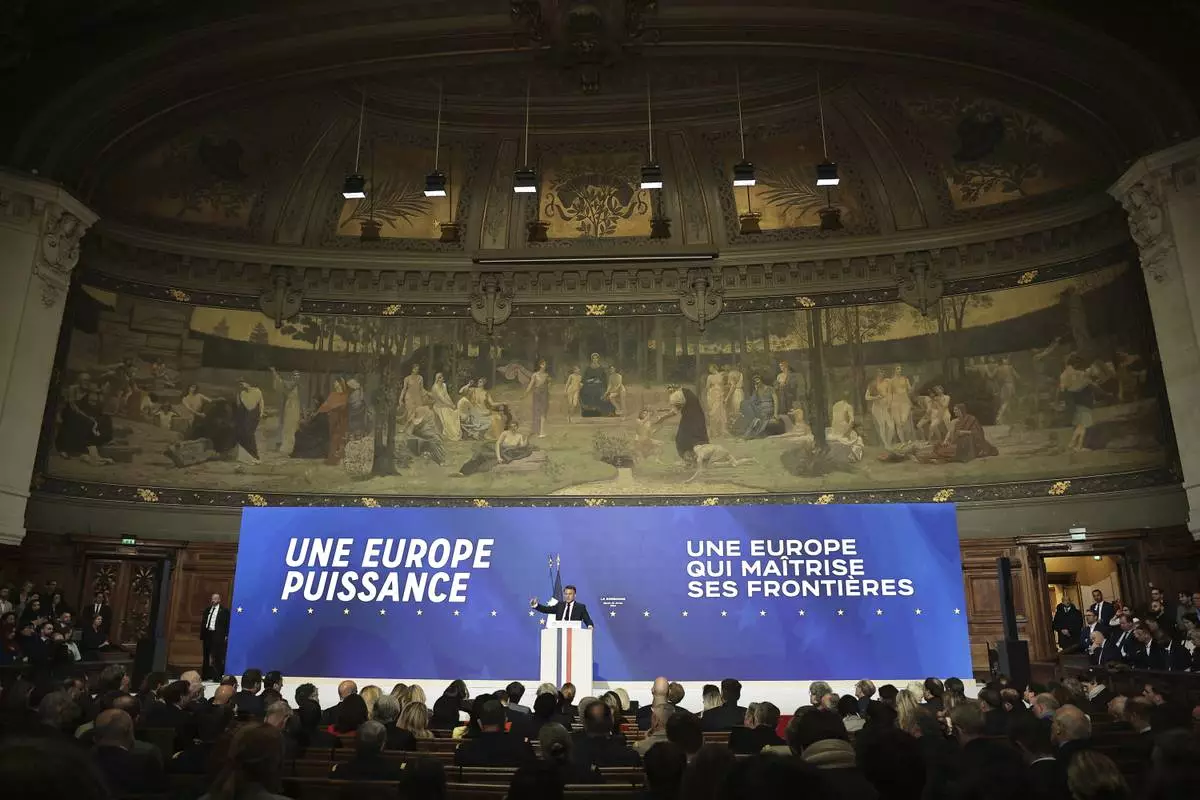
French President Emmanuel Macron delivers a speech on Europe in the amphitheater of the Sorbonne University, Thursday, April 25 in Paris. 2024. French President Emmanuel Macron will outline his vision for Europe as a more assertive global power at the backdrop of war in Ukraine, security, and economic challenges in a speech ahead of pivotal election for the European Parliament in June. (Christophe Petit Tesson, Pool via AP)
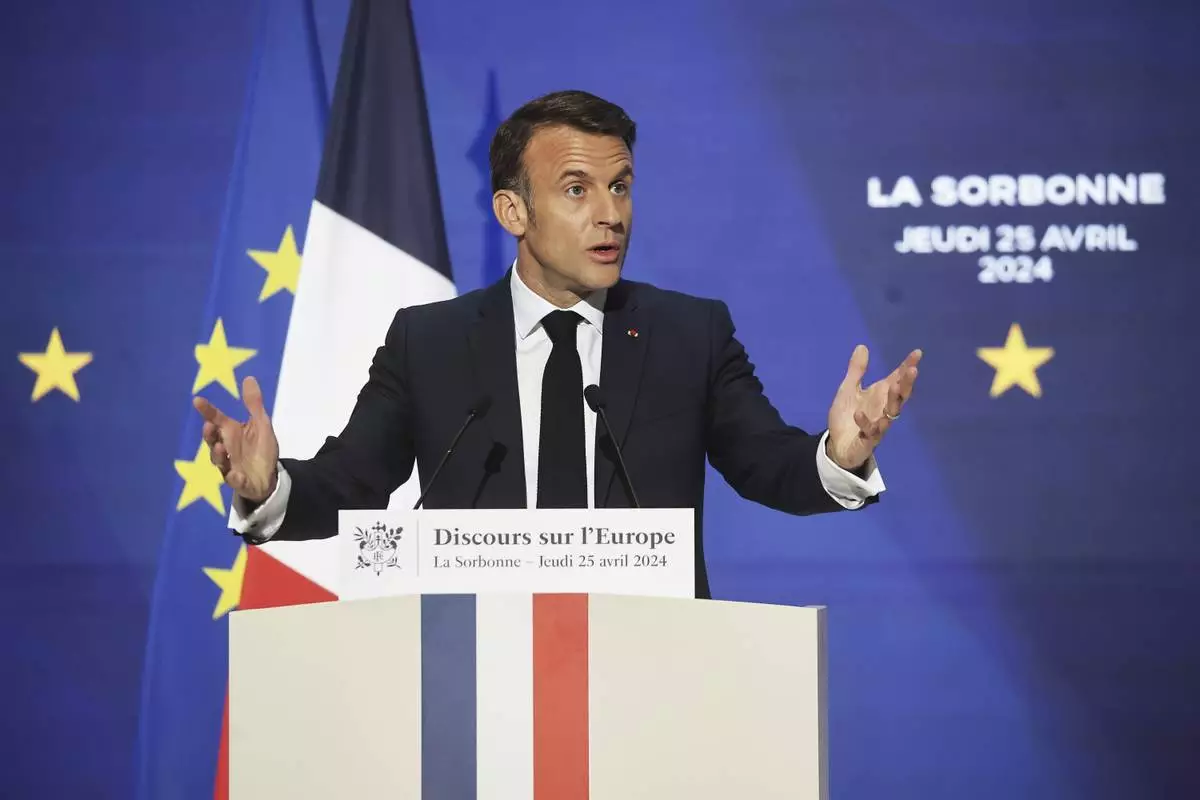
French President Emmanuel Macron delivers a speech on Europe in the amphitheater of the Sorbonne University, Thursday, April 25 in Paris. 2024. French President Emmanuel Macron will outline his vision for Europe as a more assertive global power at the backdrop of war in Ukraine, security, and economic challenges in a speech ahead of pivotal election for the European Parliament in June. (Christophe Petit Tesson, Pool via AP)
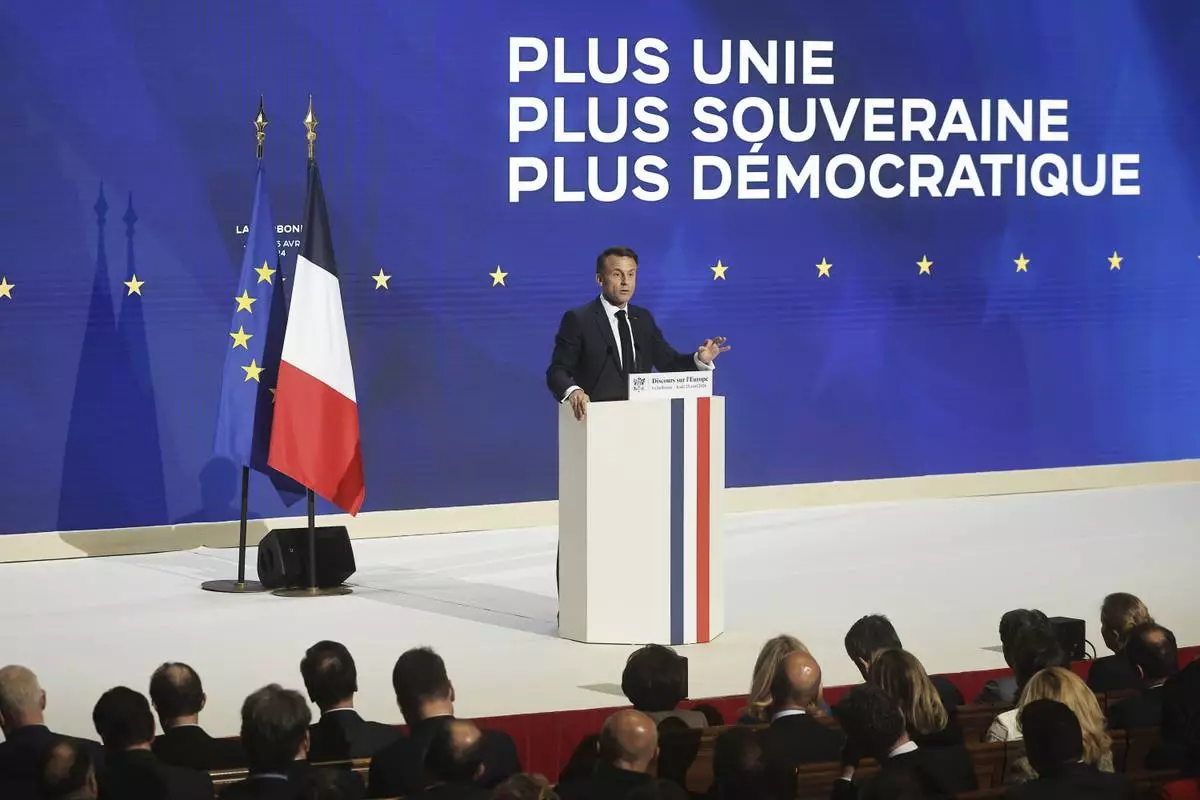
French President Emmanuel Macron delivers a speech on Europe in the amphitheater of the Sorbonne University, Thursday, April 25 in Paris. 2024. French President Emmanuel Macron will outline his vision for Europe as a more assertive global power at the backdrop of war in Ukraine, security, and economic challenges in a speech ahead of pivotal election for the European Parliament in June. (Christophe Petit Tesson, Pool via AP)
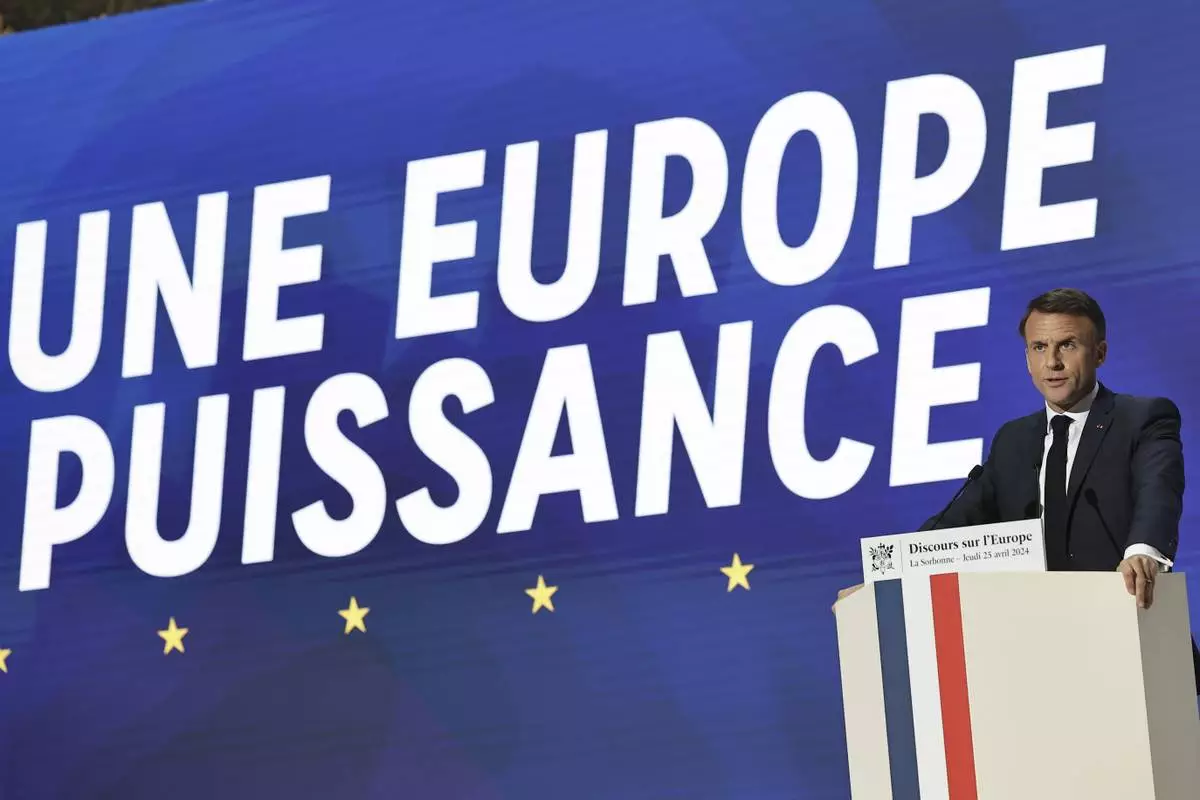
French President Emmanuel Macron delivers a speech on Europe in the amphitheater of the Sorbonne University, Thursday, April 25 in Paris. 2024. French President Emmanuel Macron will outline his vision for Europe as a more assertive global power at the backdrop of war in Ukraine, security, and economic challenges in a speech ahead of pivotal election for the European Parliament in June. (Christophe Petit Tesson, Pool via AP)
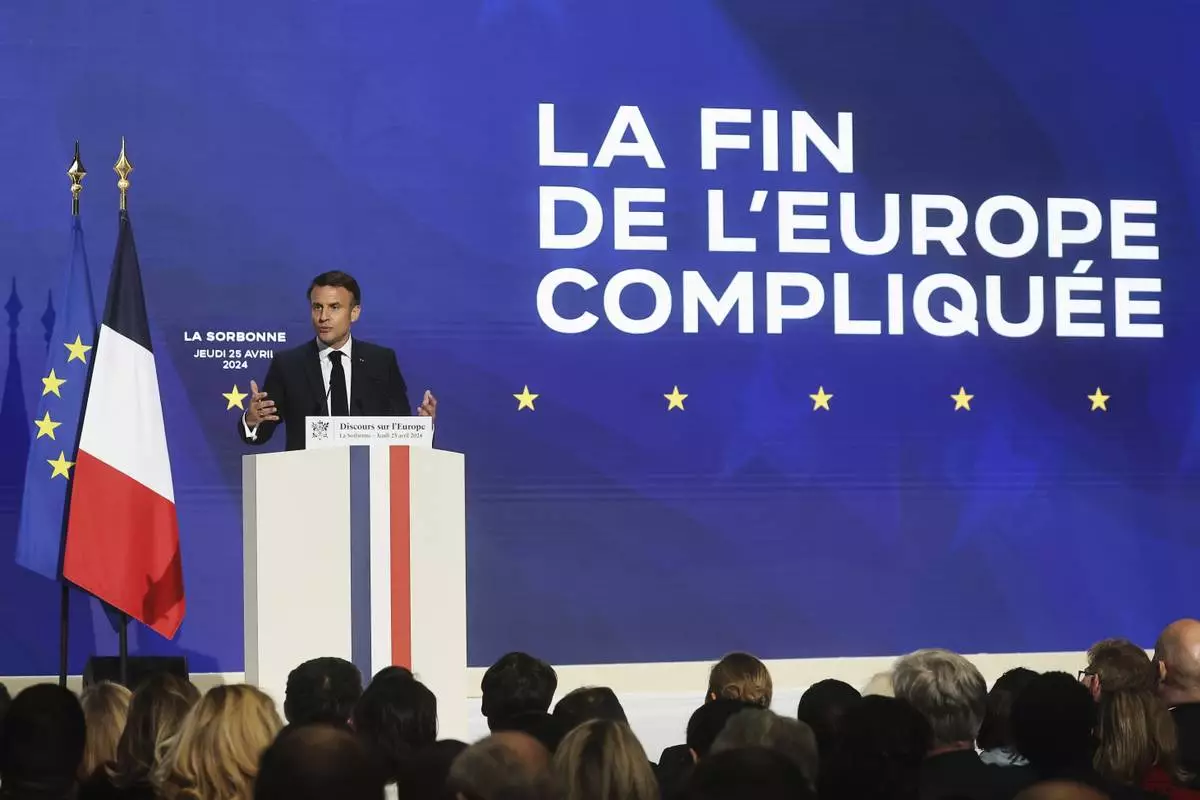
French President Emmanuel Macron delivers a speech on Europe in the amphitheater of the Sorbonne University, Thursday, April 25 in Paris. 2024. French President Emmanuel Macron will outline his vision for Europe as a more assertive global power at the backdrop of war in Ukraine, security, and economic challenges in a speech ahead of pivotal election for the European Parliament in June. (Christophe Petit Tesson, Pool via AP)
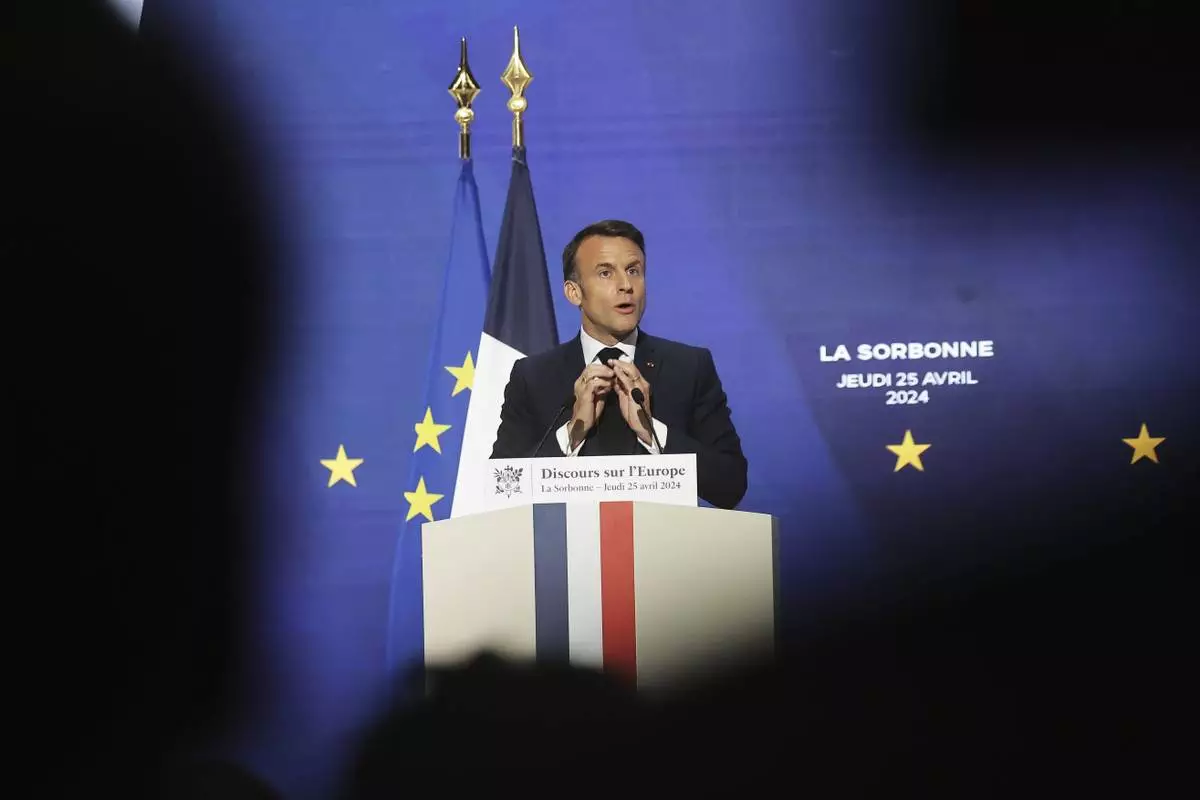
French President Emmanuel Macron delivers a speech on Europe in the amphitheater of the Sorbonne University, Thursday, April 25 in Paris. 2024. French President Emmanuel Macron will outline his vision for Europe as a more assertive global power at the backdrop of war in Ukraine, security, and economic challenges in a speech ahead of pivotal election for the European Parliament in June. (Christophe Petit Tesson, Pool via AP)
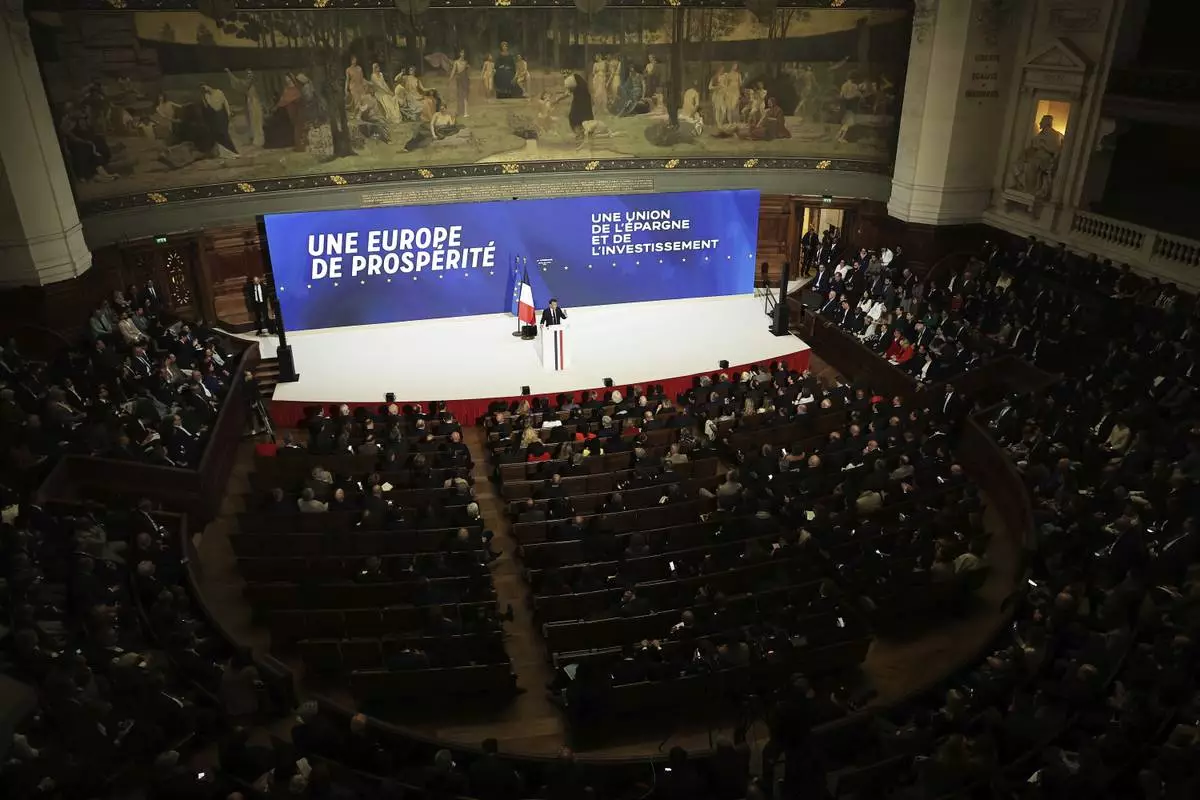
French President Emmanuel Macron delivers a speech on Europe in the amphitheater of the Sorbonne University, Thursday, April 25 in Paris. 2024. French President Emmanuel Macron will outline his vision for Europe as a more assertive global power at the backdrop of war in Ukraine, security, and economic challenges in a speech ahead of pivotal election for the European Parliament in June. (Christophe Petit Tesson, Pool via AP)
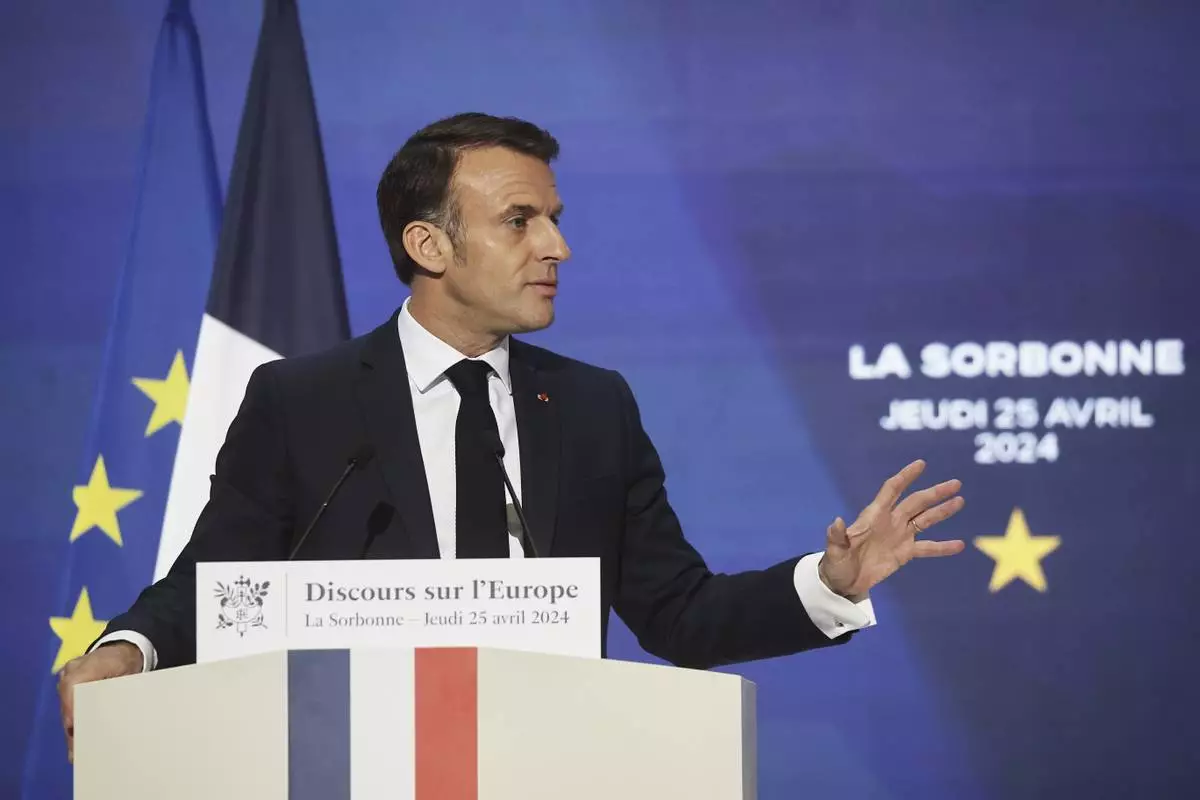
French President Emmanuel Macron delivers a speech on Europe in the amphitheater of the Sorbonne University, Thursday, April 25 in Paris. 2024. French President Emmanuel Macron will outline his vision for Europe as a more assertive global power at the backdrop of war in Ukraine, security, and economic challenges in a speech ahead of pivotal election for the European Parliament in June. (Christophe Petit Tesson, Pool via AP)
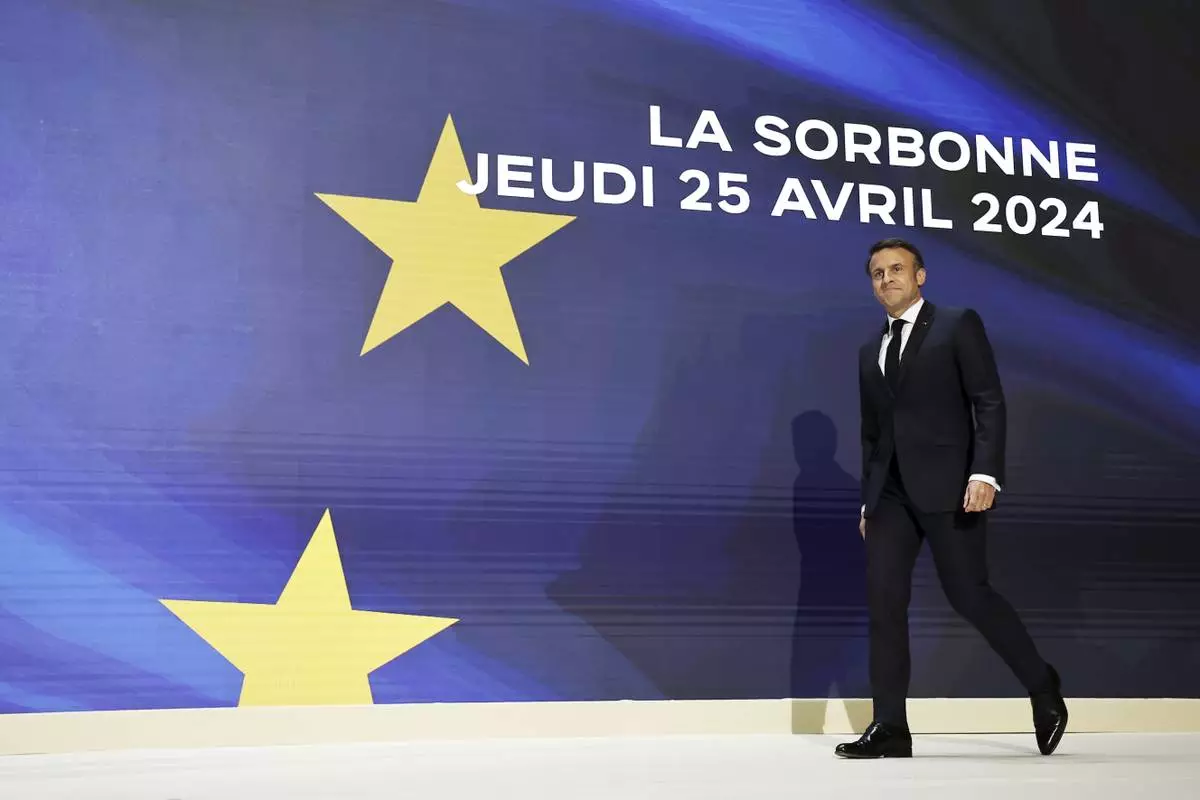
French President Emmanuel Macron arrives to deliver a speech on Europe in the amphitheater of the Sorbonne University, Thursday, April 25 in Paris. 2024. French President Emmanuel Macron will outline his vision for Europe as a more assertive global power at the backdrop of war in Ukraine, security, and economic challenges in a speech ahead of pivotal election for the European Parliament in June. (Christophe Petit Tesson, Pool via AP)
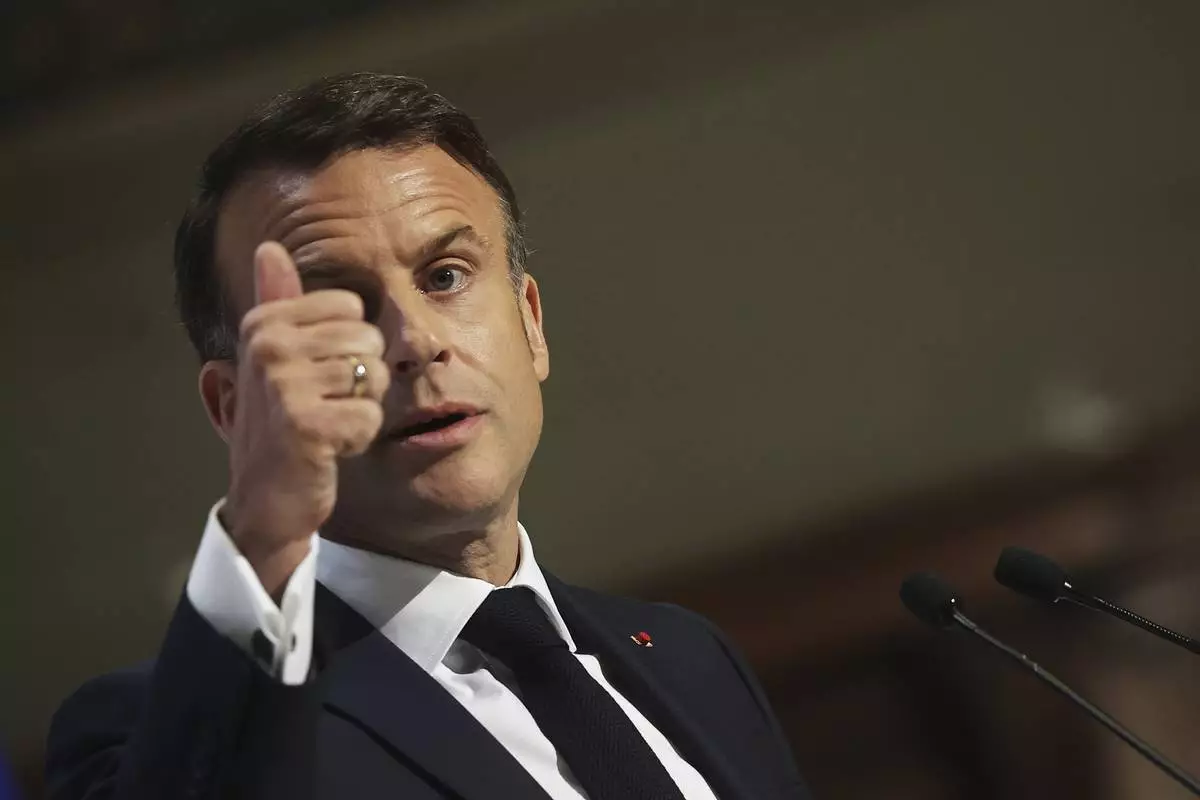
French President Emmanuel Macron delivers a speech on Europe in the amphitheater of the Sorbonne University, Thursday, April 25 in Paris. 2024. French President Emmanuel Macron will outline his vision for Europe as a more assertive global power at the backdrop of war in Ukraine, security, and economic challenges in a speech ahead of pivotal election for the European Parliament in June. (Christophe Petit Tesson, Pool via AP)
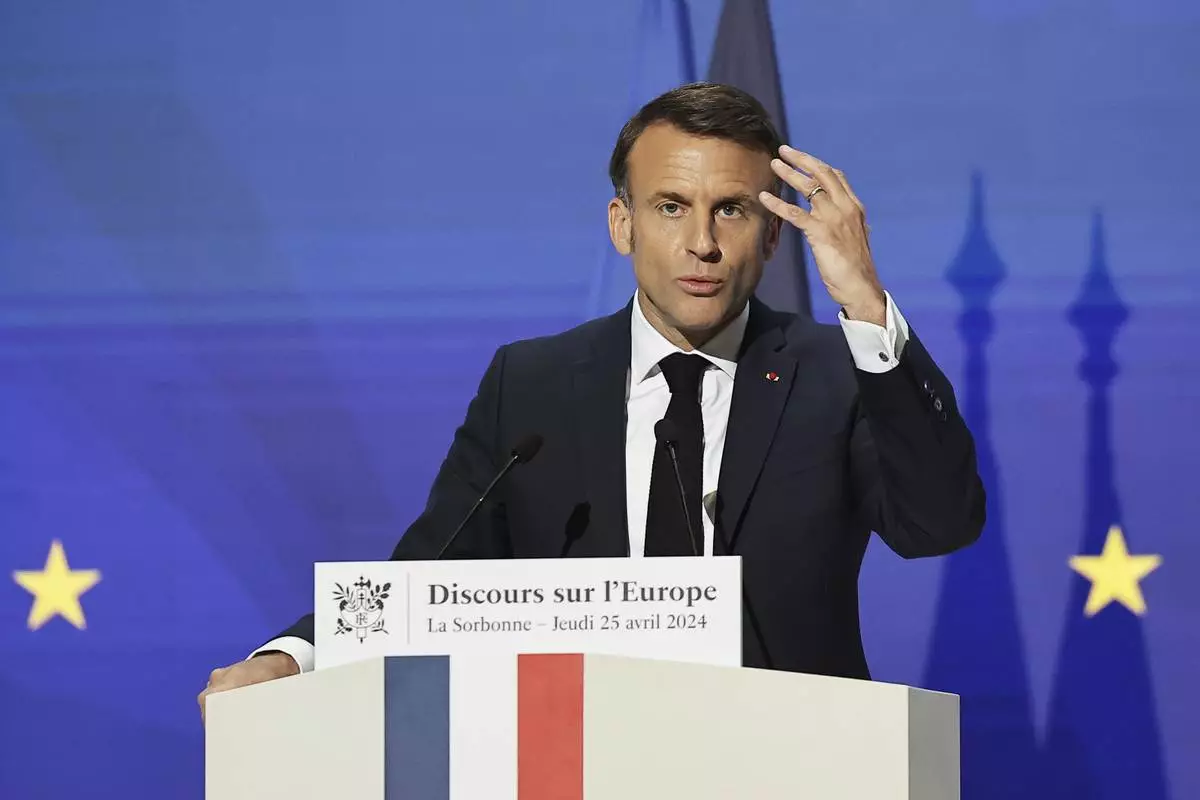
French President Emmanuel Macron delivers a speech on Europe in the amphitheater of the Sorbonne University, Thursday, April 25 in Paris. 2024. French President Emmanuel Macron will outline his vision for Europe as a more assertive global power at the backdrop of war in Ukraine, security, and economic challenges in a speech ahead of pivotal election for the European Parliament in June. (Christophe Petit Tesson, Pool via AP)
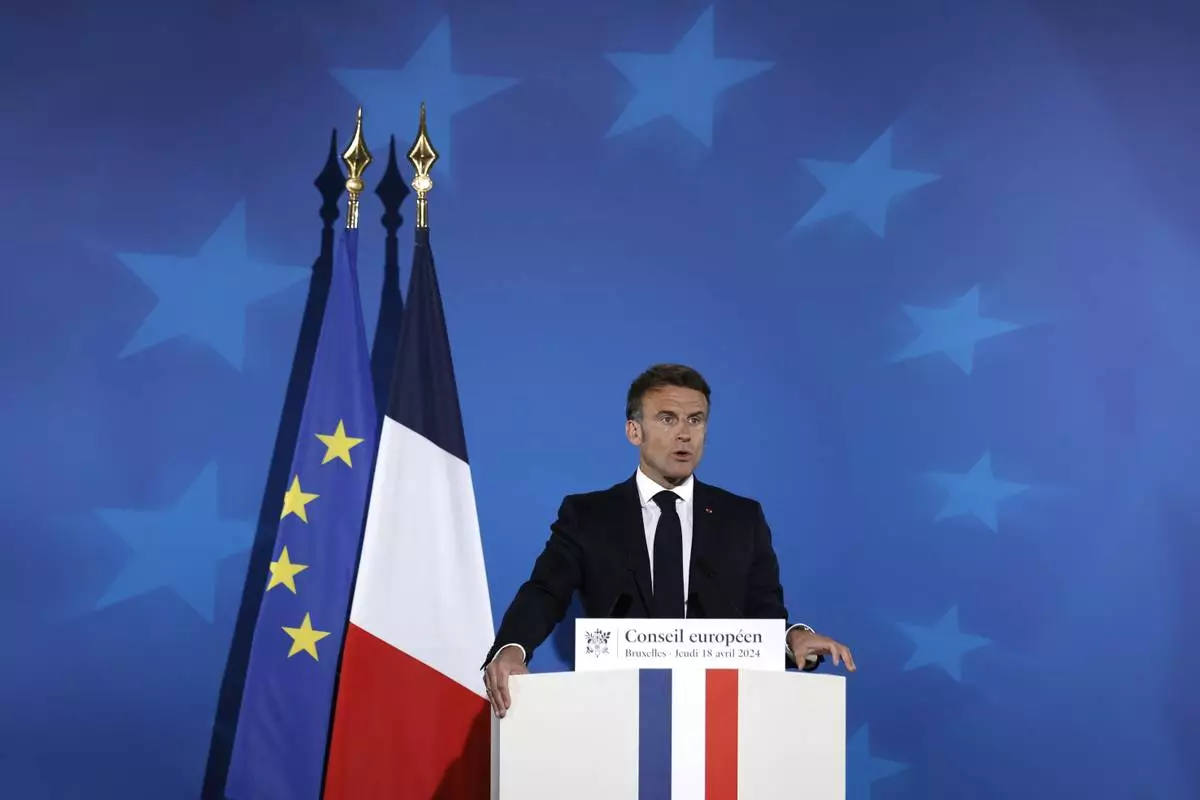
French President Emmanuel Macron speaks during a media conference at an EU summit in Brussels, Thursday, April 18, 2024. European Union leaders on Wednesday debated a new "European Competitiveness Deal" aimed at helping the 27-nation bloc close the gap with Chinese and American rivals amid fears the region's industries will otherwise be left behind for good. (AP Photo/Omar Havana)




























